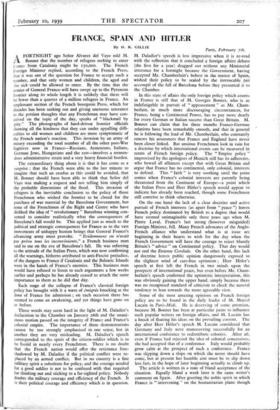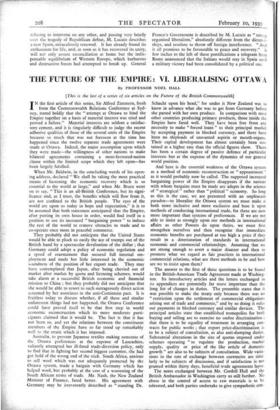FRANCE, SPAIN AND HITLER
By D. R. GILLIE
Paris, February 7th.
AFORTNIGHT ago Seiior Alvarez del Vayo told M. Bonnet that the number of refugees seeking to enter France from Catalonia might be iso,000. The French Foreign Minister replied, according to the French Press, that it was out of the -question for France to accept such a number, and that only women and children, the aged and the sick -could be allowed to enter. By the time that the armies of General Franco will have swept up to thePyrenean frontier along its whole length it is unlikely, that there will be fewer than a quarter of a million refugees in France. An unpleasant section of the French bourgeois Press, which for decades has been seeking out and giving unctuous utterance to the pettiest thoughts that any Frenchman may have con- ceived on the topic of the day, speaks of "blackmail by pity." The photographs of hard-driven frontier officials showing all the kindness that they can under appalling diffi- culties to old women and children are more symptomatic of the French nation's reaction. This invasion by an army of misery exceeding the total number of all the other post-War fugitives now in France—Russians, Armenians, Italians, German Jews, Hungarians and the rest—involves a tremen- dous administrative strain and a very heavy financial burden.
The extraordinary thing about it is that it has come as a surprise ; that the French were able to the last minute to imagine that such an exodus as this could be avoided, that M. Bonnet should have been able to think that Setior del Vayo was making a request and not telling him simply of the probable dimensions of the flood. This invasion of refugees is the inevitable conclusion to the policy of those Frenchmen who wished the frontier to be closed for the purchase of war material by the Barcelona Government, but none of the Frenchmen of the Right and Centre who have disliked the idea- of " revolutionary " Barcelona winning con- sented to consider realistically what the consequences of Barcelona's fall would be. This applied just as much to the political and strategic consequences for France as to the vast movements of unhappy human beings that General Franco's advancing army must provoke. " Evidemment on n'avait pas prevu tous les inconvenients," a French business man said to me on the eve of Barcelona's fall. He was referring to the attitude of the Italian Press, which was now confirming all the warnings, hitherto attributed to anti-Fascist prejudice, of the dangers to France if Catalonia and the Balearic Islands were in the hands of France's enemies. This business man would have refused to listen to such arguments a few weeks earlier and perhaps he has already ceased to attach the same importance to them as he did that day.
Each stage of the collapse of France's classical foreign policy has brought with it a wave of émigrés knocking at the door of France for admission ; on each occasion there has seemed to come an awakening, and yet things have gone on as before.
These words may seem hard in the light of M. Daladier's declaration to the Chamber on January 26th and the unani- mous motion passed on the integrity of France and France's colonial empire. The importance of these demonstrations cannot be too strongly emphasised in one sense, but in another they are very misleading. M. Daladier's speech corresponded to the spirit of the citizen-soldier which is to be found in nearly every Frenchman. There is no doubt that the French nation would offer the resistance fore- shadowed by M. Daladier if the political conflict were re- placed by an armed conflict. But in no country is a fine military spirit a substitute for policy, and the courage needed for a good soldier is not to be confused with that required for thinking out and sticking to a far-sighted policy. Nobody doubts the military courage and efficiency of the French. It is their political courage and efficiency which is in question. M. Daladier's speech is less impressive when it is re-read with the reflection that it concluded -a foreign affairs debate (the first for a year) dragged out without any Ministerial utterance for a fortnight because the Government, having accepted Mr. Chamberlain's behest in the matter of Spain, wished their policy to be sealed by the irrevocable fait accompli of the fall of Barcelona before they presented it to the Chamber.
In this state of affairs the only foreign policy which counts in France is still that of M. Georges Bonnet, who is as indefatigable in pursuit of " appeasement " as Mr. Cham- berlain, in much more discouraging circumstances, for France, being a Continental Power, has to pay more dearly for every German or Italian success than Great Britain. M. Bonnet can claim that for three months Franco-German relations have been remarkably smooth, and that in general he is following the lead of Mr. Chamberlain, who constantly renews his assurances that France and England have never been closer linked: But anxious Frenchmen look in vain for a doctrine by which international events can be measured in terms of French foreign policy. The "Empire policy" improvised by the apologists of Munich still has its adherents, who bewail all alliances except that with Great Britain and argue that France has no continental, only colonial, interests to defend. This " faith " is very soothing until the point comes when France's colonial interests are patently being threatened from the Continent of Europe—a point which the Italian Press and Herr Hitler's speech would appear to indicate has already been reached, though some Frenchmen still contrive to think otherwise.
On the one hand the lack of a clear doctrine and active pursuit of French interests (as apart from "peace ") leaves French policy dominated by British to a degree that would have seemed unimaginable only three years ago when M. Pierre Laval, France's last strong (however misguided) Foreign Minister, fell. Many French advocates of the Anglo- French alliance who understand what is at issue are beginning in their hearts to wish for the day when the French Government will have the courage to reject bluntly Britain's " advice " on Continental policy. That day would not end the Entente Cordiale. On the other hand, this lack of doctrine leaves public opinion dangerously exposed to the slightest wind of care-free optimism ; Herr Hitler's speech at first left the French in two minds upon the prospects of international peace, but even before Mr. Cham- berlain' S speech confirmed the optimistic interpretation, this was obviously gaining the upper hand, simply because there was no recognised standard of criticism to check the natural tendency to lean towards the more agreeable view.
Some of the most amazing opinions on French foreign policy are to be found in the daily leader of M. Marcel Lucain in Paris-Midi. He is deserving of some attention, because M. Bonnet has been at particular pains to influence such popular writers on foreign affairs, and M. Lucain has a knack of floating his ideas on the prevailing current. The day after Herr Hitler's speech M. Lucain considered that Germany and Italy were manoeuvring successfully for an international conference to redistribute colonies. . After all, even if France had rejected the idea of colonial concessions, she had accepted that of a conference. Italy would probably grow calm at the prospect of such a conference. France was slipping down a slope on which. she never should have come, but at present her humble aim must be to slip down less fast, in the hope of later beginning actually to climb up.
The article is written in a tone of bland acceptance of the situation. Equally bland a week later is the same writer's comment on Spain. After greeting the noble spirit in which France is " intervening " on the humanitarian plane though refusing to intervene on any other, and passing very briefly over the tragedy of Republican defeat, M. Lucain describes a new Spain, miraculously renewed. It has already found its enthusiasm for life, and, as soon as it has recovered its unity, will not only assure reconciliation at home but the indis- pensable equilibrium of Western Europe, which barbarous and destructive forces had attempted to break up. General Franco's Government is described by M. Lucam as "Strong organised liberalism," absolutely different from the dictator- ships, and resolute to throw off foreign interference. "And it all promises to be favourable to peace and recovery." A few inches to the left of these pontifications a telegram from Rome announced that the Italians would stay in Spain until a military victory had been consolidated by a political one.















































 Previous page
Previous page